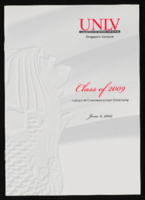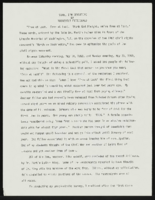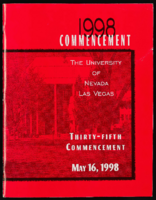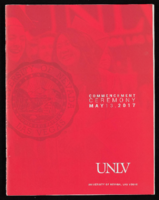Search the Special Collections and Archives Portal
Search Results

Meeting minutes for Consolidated Student Senate, University of Nevada, Las Vegas, March 06, 1979
Date
1979-03-06
Archival Collection
Description
Includes meeting agenda and minutes. CSUN Session 7 Meeting Minutes and Agendas.
Text

Meeting minutes for Consolidated Student Senate, University of Nevada, Las Vegas, February 26, 1974
Date
1974-02-26
Archival Collection
Description
Agenda and meeting minutes for the University of Nevada, Las Vegas Student Senate. CSUN Session 2 Meeting Minutes and Agendas.
Text

Meeting minutes for Consolidated Student Senate, University of Nevada, Las Vegas, September 10, 1979
Date
1979-09-10
Archival Collection
Description
Agenda and meeting minutes for the University of Nevada, Las Vegas Student Senate. CSUN Session 8 Meeting Minutes and Agendas.
Text

Interview with Oscar Foger, May 5, 2005
Date
2005-05-05
Archival Collection
Description
Narrator affiliation: Miner, Reynolds Electrical and Engineering Company (REECo)
Text

Meeting minutes for Consolidated Student Senate, University of Nevada, Las Vegas, March 22, 1983
Date
1983-03-22
Archival Collection
Description
Includes meeting agenda and minutes along with additional information about the transmitter site lease agreement. CSUN Session 13 (Part 1) Meeting Minutes and Agendas.
Text

Meeting minutes for Consolidated Student Senate, University of Nevada, Las Vegas, November 1, 1983
Date
1983-11-01
Archival Collection
Description
Includes meeting agenda and minutes. CSUN Session 14 Meeting Minutes and Agendas.
Text

University of Nevada, Las Vegas (UNLV) Singapore Campus Class of 2009 Inaugural Commencement Ceremony program
Date
2009-06-06
Archival Collection
Description
Commencement program from University of Nevada, Las Vegas Commencement Programs and Graduation Lists (UA-00115).
Text

"Sure, I'm Sensitive": article draft by Roosevelt Fitzgerald
Date
1988
Archival Collection
Description
From the Roosevelt Fitzgerald Professional Papers (MS-01082) -- Drafts for the Las Vegas Sentinel Voice file. On "Willie B" free at last.
Text

University of Nevada, Las Vegas (UNLV) 35th commencement program
Date
1998-05-16
Archival Collection
Description
Commencement program from University of Nevada, Las Vegas Commencement Programs and Graduation Lists (UA-00115).
Text

University of Nevada, Las Vegas (UNLV) Spring 2017 commencement program
Date
2017-05-13
Archival Collection
Description
Commencement program from University of Nevada, Las Vegas Commencement Programs and Graduation Lists (UA-00115).
Text
Pagination
Refine my results
Content Type
Creator or Contributor
Subject
Archival Collection
Digital Project
Resource Type
Year
Material Type
Place
Language
Records Classification
